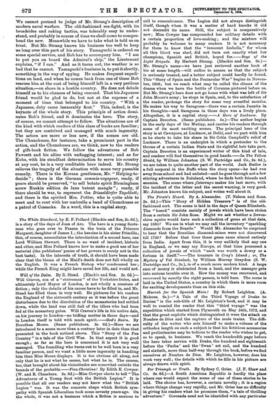Will of the Dales. By R. Stead. (Blackie and Son.
2s, 6d.)— Will Craven, son of a "statesman" of the Yorkshire Dales, and ultimately Lord Mayor of London, is not wholly a creature of fiction ; only the details of his career have to be filled in, and Mr. Stead has filled them in very well. He pictures for his readers the England of the sixteenth century as it was before the great disturbance due to the dissolution of the monasteries had settled down, while the land was still full of the idlers who had been fed at the monastery gates. Will Craven's life in his native dale, on his journey to London—no trifling matter in those days—and in London itself is told with much spirit.---God's Bairn. By Dorothea Moore. (Same publishers. 3s. 6d.)—Here we are introduced to a scene more than a century later in date than that presented in the book noticed above. This "Story of the Fen Country" is a tale of the Civil War. In that aspect it is good enough ; as far as the hero is concerned it is not very well insuriged. The foundling who turns out to be well born is a very familiar person, and we want a little more ingenuity in handling him than Miss Moore displays. It is too obvious all along, not only that he is not what he seems, but what he is. The causes, too, that brought about his vicissitudes are somewhat outside the bounds of the probable.—Viva Christina! By Edith E. Cowper. (W. and R. Chambers. 3s. 6d.)—Miss Cowper elects to tell "The Adventures of a Young Scot with the British Legion." It is possible that all our readers may not know what the "British Legion" was. It was the concrete shape which British sym- pathy with Spanish Liberalism took some seventy years ago. On the whole, it was not a business which a Briton is anxious to call to remembrance. The Legion did not always distinguish itself, though when it was a matter of hard knocks it did not discredit its name. Still, the subject is comparatively new; Miss Cowper has compounded her military details with a certain proportion of love-making ; and the mixture will probably be welcome to many readers. It is not necessary for them to know that the "innocent Isabella," for whom all this blood was shed, did not turn out exactly what her champions, Spanish and British, hoped for.—Boys of the Light Brigade. By Herbert Strang. (Blackie and Son. 6s.)— Mr. Strang's name—we have just reviewed another book of his at some length—will suffice to assure us that the subject is seriously treated, and a better subject could hardly be found. This "Story of Spain and the Peninsular War" begins in Novem- ber, 1808; but we reach what may be called the climax of the drama when we have the battle of Corunna pictured before us. But Mr. Strang's hero does not go home with what was left of Sir John Moore's army ; he stops in Spain, and, to the satisfaction of the reader, prolongs the story for some very eventful months. He makes his way to Saragossa—there was a certain Juanita in his thoughts—and Saragossa in those days was a lively place. Altogether, it is a capital story.—A Hero of Lucknow. By Captain Brereton. (Same publishers. 5s.)—The author begins in the early days of the Mutiny, and carries his readers through some of its most exciting scenes. The principal hero of the story is at Cawnpore, at Lucknow, at Delhi, and we part with him as he starts to take his share in Sir Colin Campbell's relief of Luck-now. There is an underplot in which a pretender to the throne of a certain Indian State and its rightful heir take part. Captain Brereton is an experienced writer of this kind of tale, and readers will find themselves in good hands.—In The Yellow Shield, by William Johnston (S. W. Partridge and Co., 2s. 6d.), we are taken to quite another part of the world. Jack Butler is a full corporal in the Buffs when the story opens—he had run away from school and had enlisted—and he goes through not a few stirring adventures in Zululand, where he finds both friends and enemies. The scene where ;Cetswayo makes his last move, with the incident of the letter and the secret warning, is very good. Mr. Johnston knows his subject, and writes well about it.






































































 Previous page
Previous page